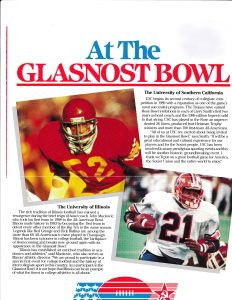By Katie Higley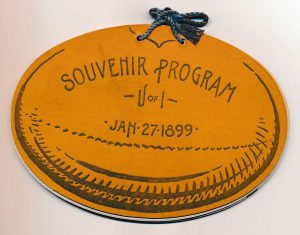
With the recent Illini Spring Game and the NFL Draft, football is on the mind for many of us. If you’re missing football, especially your Fighting Illini, you should check out the many football-related collections at the Student Life and Culture Archives (SLC) in the Archives Research Center!
The Fighting Illini football team has a long, rich history documented in our collections. SLC is home to the papers of Arthur Hall, coach of the Illini Football team in 1904 and 1907-1912. The collection features hand-drawn football plays, artifacts such as Illinois athletic sweaters, and football souvenir programs [1]. Memorial Stadium officially opened on November 3, 1923, with a Homecoming matchup against Chicago [2]. Illinois Central Train Service helped fans attend the game by offering a special service from Chicago to Champaign for only $4.56 [3].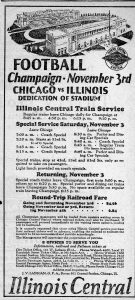
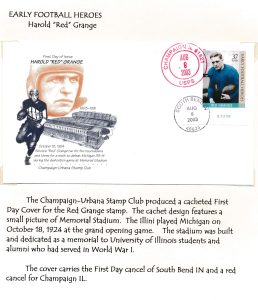
Aside from the game being memorable for the opening of Memorial Stadium, it was also a Homecoming victory for Illinois, with the Fighting Illini beating Chicago 7-0 [4]. Memorial Stadium was officially dedicated on October 18, 1924, in another Homecoming victory against Michigan. During the game, Illini legend Harold “Red” Grange ran for five touchdowns and threw a sixth. The Champaign-Urbana Stamp Club celebrated his historic performance in their Early Football Heroes stamp collection [5].
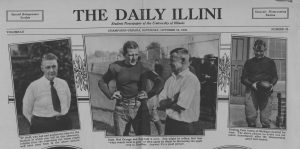
Our long historic tradition with Homecoming celebrations is illustrated in this souvenir Homecoming edition of The Daily Illini, featuring photos of George Huff, Red Grange, and Robert Zuppke from 1925 [6].
SLC is also home to audiovisual collections documenting the Fighting Illini in motion. The Football Game Films and Videotapes collection has copies of Illini football games from 1937 to 1994. Highlights from this collection include footage from the Fighting Illini Rose Bowl appearances in 1952, 1964, and 1984 [7]. The Football Highlights Films and Videotapes collection includes general Big Ten football Highlights and Illinois football highlights [8].
In late 1970, controversy erupted over the firing of head coach James Valek. In a memorandum prepared by Charles E. Flynn, the then President’s and Chancellor’s Liaison Representative to the Board of Directors of the Athletic Association, he wanted to set the record straight by laying out the timeline of Valek’s firing in response to “considerable misinterpretation” of the situation by the media [9]. On October 23, the initial decision to re lieve Valek of his coaching duties after the Ohio State game on October 24 was made. This caused considerable upset with the team, which led to a revision of the initial decision. Valek would be allowed to continue coaching the final four games of the season. Valek’s contract was officially terminated on August 31, 1971. The public, including alumni, was angered at what they perceived as Valek being “fired twice [10].” Merrill and Zita Holden (class of 1949) wrote to the Athletic Association Board of Directors stating, “Never have we been as ashamed of our alma mater as today …it was Jim Valek who inherited the thankless job of gathering the remnants of a thoroughly demoralized team … it is not fair or honest that someone else reap the eventual benefits of his conscientious and diligent labors [11].” Bob Blackman would replace Valek as head coach in 1971.
In 1989, Illinois football almost made history by competing in the Glasnost Bowl. The Glasnost Bowl, which was planned to be an annual event, would have written Illinois and the University of Southern California (USC) into history as participants in the first football game played in the Soviet Union. The game was initially scheduled for September 2, 1989, in Moscow’s Dynamo Stadium. Illinois head coach John Mackovic stated, “We are proud to participate in a special first event for college football and the history of intercollegiate sport in this country. As a participant in the Glasnost Bowl, we hope that Illinois can be an example of what the finest in college athletics is about [12].” Despite great enthusiasm from both teams at the prospect, the game was officially canceled by Raycom Sports Entertainment on June 7, 1989. Raycom stated the reason for the cancellation was contract issues with Soviet sports authorities. The Glasnost Bowl was downgraded to a regular season game. This flyer for the Glasnost Bowl depicts what could have been [13].
If you are interested in viewing these materials or any other materials at the Archives Research Center, please give us a call at 217-333-7841.
[1] Record Series (RS) 28/3/24 Box 1, “Football Plays and Coaching Materials, n.d.” and “Football Souvenir Programs, 1899-1950.” Box 2, “Artifacts.”
[2], [4] “Memorial Stadium – Facilities,” University of Illinois Division of Intercollegiate Athletics, https://fightingillini.com/facilities/memorial-stadium/64.
[3], [6] RS 26/2/5 Box 13, “Football, 1920-1929.”
[5] RS 26/20/220 Box 1, “Souvenir Stamps and Envelopes – Illinois Icons, 1943, 2003, 2008.”
[7] RS 28/3/15
[8] RS 28/3/16
[9]-[11] RS 26/1/5 Box 8, “Football Controversy, October 1970.”
[12]-[13] RS 26/2/5 Box 12, “Football – Glasnost Bowl, 1989.”
